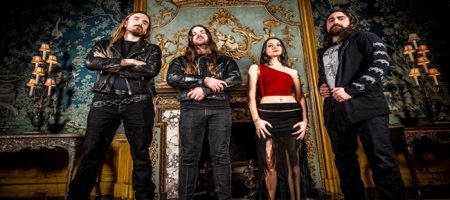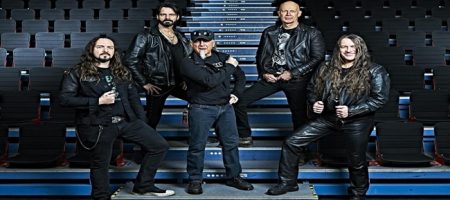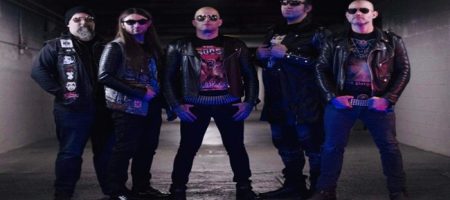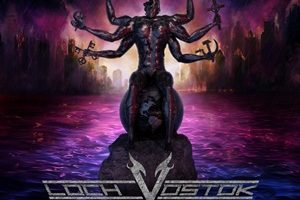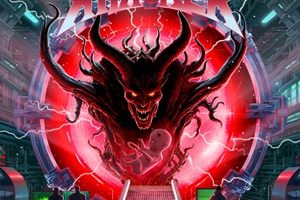Temperance – Awaiting Hermitage
Thursday, 2nd November 2023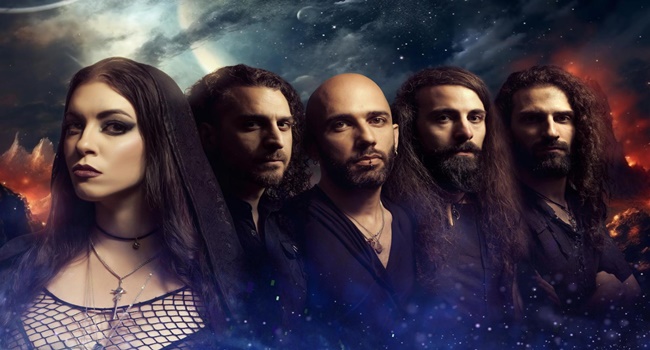
Italian band Temperance have come a long way since there inception a decade ago. Blending together a mix of melodic heavy/power metal with progressive and symphonic elements, they now arrive at their most expansive and ambitious record for Hermitage – Daruma’s Eyes Part 2. A conceptual story that originally started with one song on their 2018 Of Jupiter and Moons album, the songwriting, performances, and guest appearances give this record a feel that is more cinematic, bombastic, and epic – evoking images of Avantasia and Rhapsody at times.
We reached out to the group’s newest singer Kristin Starkey as well as guitarist/vocalist Marco Pastorino to learn more about the conceptual storyline, special guest choices, how Kristin got the chance to be a part of Temperance, her operatic background and how it helps her metal career, vocal coaching, how life on the road was this past summer with Twilight Force and Temperance, plus future plans.
Dead Rhetoric: What are some of your earliest memories surrounding music growing up in childhood? At what point did you start discovering and enjoying heavier forms of music – and eventually wanting to perform in your own bands?
Kristin Starkey: For me, I have always sung around my house. I was a singing lover as a kid, always involved in choirs and stuff. The defining experience for me is when I saw Avenged Sevenfold, and I think I owe them my entire music career which is kind of funny to say. I discovered them when I was twelve, I went to Tower Records and I got a promo CD, and the new album at the time was Waking the Fallen. The two demo songs blew me away, and then they toured that album. I saw them at a bar in my hometown, and somehow it was all-ages as I was thirteen at the time. I went to the show, and I lost my shit. I told myself that this is what I want to do, I’m dedicating my life to music. It was that show and that band that made me just want to do this.
And then you get a little older and you realize, alright – what do I do with music? It’s not realistic to say I’m going to be a singer in a metal band – that sounds stupid. I was a classical guitarist, and I did my undergraduate in classical guitar. In my undergrad, I had teachers that were pushing me to sing, they heard me sing – they thought I should do lessons, that I had a unique voice, contralto is a little rare to find. Okay – I just never thought anything of it. I ended up really loving it, pursuing it, and had great teachers over the years. So much so I ended up getting my master’s in vocal performances, and onwards I finished a doctorate in vocal performance – which sounds like the most useless degree ever, but I felt like I wasn’t really prepared at the end of my master’s to go out into the world of opera. I’ve been a metalhead my whole life, but this is the more traditional path of doing things in music, in the classical sense. I thought I would just be an opera performer and a classical performer, but this ended up not being the case.
The pandemic took away all my other jobs I had lined up. I did a YouTube channel, put up some metal covers, and didn’t think anything would come of it. But everything came out of it. (laughs). And that’s why I’m speaking to you right now.
Dead Rhetoric: So, because of your YouTube channel and your live/studio work with Twilight Force, is that how you got the interest to join Temperance?
Starkey: I think it was mostly YouTube. I met Marco on the 70,000 Tons of Metal cruise back in 2019. We kept in touch, he was super nice, and he’s a great guy. After that, he would follow me along, I did a cover of the Beast in Black song “Cry Out For a Hero” – he told me that was the cover that made him go, I want this person in my band. He called me up, and said hey – we have a tour, and we are going to lose Alessia. We have a tour coming up with Tarja, and a headliner tour. I thought that was crazy, and I said yes- even though it overlapped with my Twilight Force tour, so I had literally no days off. I took a plane to Spain from the end of one tour and started another two months with Temperance. Two days after that, he asked me if I wanted to actually join the band. I said, okay – I didn’t say that right away, I wanted to get to know the guys before I committed. I’m not flaky, I want to make sure I commit to something and find out if they are good people, nice people – and of course they are. At the time I wanted to be cautious.
And then there was another problem – the album has to be done before we go on tour. Okay – so I ended up recording the album. He had to rewrite the album with my voice in mind, since my voice is very different from Alessia’s. After he did that, I recorded the entire album in one session in just a couple of hours (laughs). There was no other choice – it was either do that, or just not do it. The album needed to be delivered before we went on this tour. I sat for a few hours, he only wanted a couple of revisions which were pretty easy to do, everything you hear from me was just a couple of hours.
Dead Rhetoric: Hermitage – Daruma’s Eyes Part 2 is the latest Temperance album, and your first studio record since joining the group. How do you feel about this record, the songwriting/ performances, and how your skill set/talents on vocals set in the catalog of discography for the group?
Starkey: I really love the record. What made me feel like I was comfortable joining Temperance is I love the direction that things are going musically on this album. I love it because it’s a little more progressive, a little more bombastic and symphonic. That’s more of my personal tastes. I was actually a little bit worried before I heard the album because I liked what Temperance was doing before, but some of it was a little too poppy for my tastes. I think I was thinking of Alessia’s vocals in mind, also. Marco, he really used all the aspects of my voice. My grit, my super high stuff, some super low stuff – the operatic stuff of course. I think the next album will be even more tailored to my range. He did some crazy work to do this super-fast. He likes to use everything I have to offer – not the straight up growls yet. There are no harsh vocals on the album, all the other sides he really uses it in a cool way.
I see a lot of fans being a little…not annoyed, but maybe wanting another album like Of Jupiter and Moons, and they are not going to get that. I think it’s different in a great way. We all really love the direction of Temperance, and I’m looking forward to seeing the reactions. The reactions so far have been really great, I’m a little nervous because of the new singer syndrome, people just hate change. It doesn’t matter, you could be the best performer ever, it doesn’t matter – people want to hear what they are comfortable with, and what they are familiar with.
Dead Rhetoric: What can you tell us regarding the conceptual lyrical theme, which I believe is an extension from “Daruma’s Eyes (Part 1)” the final song on 2018’s Of Jupiter and Moons album? As I also understand Marco has a book that will be coming out about this record, too – can you provide some details on this?
Marco Pastorino: Back in 2017-2018, I started to think and to write about this Daruma story, but I thought it was too long and too difficult to explain in one single track. That’s the reason why we called it “Daruma’s Eyes Pt.1” with the hope to complete the story and to release a full concept sooner or later during the near future. I am so grateful we had the chance to write and release this album with Napalm.
Basically, it’s a full story based on time travel and a fight between two brothers, Anningan and Irin in this fantasy village called Hermitage. But the main character of the story is Viktor, a guy from New York. He travels the world, and he reached Tokyo because he’s not satisfied with his life, and he wants to find a way to try to find himself. Then in Tokyo, in the Asakusa temples, he finds a Japanese doll, the Daruma, and just touching it he travels through space and another dimension, and he moved to Hermitage, this fantastic land. There he will meet some friends and he will have something to solve.
Dead Rhetoric: How did the special guest choices come about to add their flavor to this record?
Pastorino: We decided since the very first moment to call people and singers from our same generation, that’s the reason why we have Fabienne Erni, Laura Fella and Alessandro Conti. Fabienne was the first name that came to our minds, About Laura, I saw her one year ago in Milano with Faun and I was completely impressed. Alessandro is one of my best friends in this business for 15 years and I still think he’s one of the best power metal singers out there. Last but not least, since his work inspired us a lot over the years, we asked Arjen Lucassen from Ayreon to be the narrator of the album. He is such a hero for us, and it was a fantastic chance for us to collaborate with him.
Starkey: From what I know, Marco had an idea in mind. My voice is so dark and so different, he wanted some contrast. He felt like who better to get than some of the best singers – Fabienne, she’s absolutely stunning. We were super surprised and happy that all these people said yes – especially Arjen. That was a dream voice to have, and he agreed to it. It was Marco’s image of what he wanted, and they all agreed. I get offers from random people in my in box all the time, and it feels good that these people didn’t blow it off. It’s good to feel that validation. And with Alessandro, I sing with him in Twilight Force, he’s a great friend of mine. He was a really great choice for the high vocal parts. He recorded his one song in one day.
Dead Rhetoric: What do you enjoy most regarding the style, songwriting, and approach within Temperance? You have a trio of vocalists with different ranges and abilities, would you consider this one of the most distinctive assets that separates yourselves from others in the modern melodic/symphonic metal realm?
Starkey: For sure. And what I love now about the new album is that it really separates us more, as opposed to sounding more like what Amaranthe does, with a very similar lineup of vocalists. This is more of a collaborative, story element effort and not just more of a pop song, oriented style. I think this will help the prog fans come over to the dark side with us. I love the symphonic arrangements, they are stunning. I love the more power metal influence this has. All of it together, I’m really proud and happy. It’s something I can be proud of. I would feel weird if I couldn’t sing not being myself. I feel authentic in it, Marco made me feel like I was supposed to be a part of this.
Dead Rhetoric: You’ve also done a number of guest vocal appearances yourself – what is your approach when it comes to these endeavors? How much of a challenge is it to attain what these artists desire, especially if it’s on a remote basis?
Starkey: Everything has been on a remote basis, except for Twilight Force. On the last two albums I did the choir and background vocal work, so that’s a little bit different. The guest stuff is all remote – I don’t usually know anything about the band, or anything about the songwriting. My approach is, I try to get as much information as I possibly can, and from there I don’t love writing my own parts. It makes me feel a lot of pressure. It’s a lot of time. If someone writes the lines, the lyrics, all of that, and gives it to me, then I can make things my own in the style that it is. I think that’s also the classical singer in me – I don’t want to improv (laughs). Give me the sheet music, give me everything and I will make it beautiful.
Dead Rhetoric: You work as a professional vocal coach – what are some of the biggest or most challenging aspects you work on with your students, and do you believe that your seasoning, studies, and education also have helped you when it comes to your own voice and outlook at keeping your abilities in tip top shape?
Starkey: 1000%. The first (thing) regarding my students. The toughest thing for them to realize is having them develop your voice takes a long ass time. A lot of people think it’s an overnight fix. Also, the way I teach is I always try to go with a classical approach. I strongly believe that healthy singing begins with a classical approach first. If you think about it, classical singing has been around for hundreds of years. This sort of more metal, pop, or belting style has not. The healthy techniques are involved with both (approaches), it’s easier to access what you need to access in the classical genre first. I get more metal students, and they don’t realize that yet. I bring them back to singing healthy, and to have longevity, we need to start back here first. It can be slightly frustrating, but it is what it is. Once they realize that, they are good to go. My metal voice is 1000% in thanks to my operatic training.
I owe everything to my teachers in my graduate school. Brenda Harris is my teacher; she was so wonderful. I owe everything, the metal technique would not be healthy, or I wouldn’t be able to do sixteen shows in a row, if I didn’t have that stamina and proper training to sustain myself for that long. Teaching helps me check in with myself also, what I’m teaching them, am I also applying these tenets to myself? The education and training are the reason why I’m talking to you.
Dead Rhetoric: What was it like performing with Temperance and Twilight Force this year – where do you see the major differences when it comes to the studio performance versus the stage, does your approach differ in smaller venues versus the biggest festival stages?
Starkey: A huge difference is of course with Twilight Force I just sing backing vocals. And I do “Twilight Horizon” live, when we have the set time, and I will go up in front for that. With Temperance, I am one of the lead (singers) so I’m always up at the front, talking to the audience. With Twilight Force, I’m totally a character – this fawn, and I love it. It’s such a different feeling. Twilight Force is much more like an opera world, because I’m in character. I also sing mostly operatic backing vocals. I recorded so many layers on the Twilight Force albums, we pick the best lines to sing. I can only sing one, but the point of me being there is it’s so backing track oriented, having a live element to that track is more important. Sometimes what I do is take the high note instead. It’s a different vibe. With Temperance I’m just being myself.
With Twilight Force we’ve played some big festivals, and that’s been very surreal. I don’t think I do anything different, it’s just my nervous level changes depending on where we are going. It’s still great – the bigger the crowd, the less nervous I get. You can’t focus on how many people are there or else you are going to freak yourself out.
Dead Rhetoric: How do you see the state of the global metal scene currently? What excites you about the movement, and what changes (if any) would you like to see made for the greater good of all parties involved?
Starkey: I think the metal world is in a better spot than it has been. It’s very interesting how people release music nowadays, and I still don’t really know how I feel so much about it. How quickly you still need to be able to turn out albums to be considered relevant in today’s world. It used to be every three or four years was normal, but now it feels like you have to put out a new album every year to a year and a half, which I think is unsustainable. Emotionally, mentally, and no longer authentic. I hope that the trend isn’t super great, because your favorite musicians won’t be doing this for very much longer.
Also, what’s been really cool is I’m seeing way more women in the metal scene. That’s been amazing to see. But there is still of course the case where there are a lot of female-fronted festivals, I do not like that. With equality, you want to be given the same sort of respect as a band of guys. Why do I need my own festival? You want to put them on a pedestal, but let’s give them their own festival. No, I don’t like that. It’s well intentioned – and I don’t think it’s in the states, but in Europe there’s more of that babes and metal queens. That just cringes me so much. I just want to be playing at the same festival. Sometimes the fans are a little strange in that vein. There’s still some work to be done on that front.
Dead Rhetoric: What sort of goals or ambitions do you set for yourself at this point in your career? Do you feel like you have a good handle on not just the musical side of things, but also handling the travel, business, and other responsibilities that it takes to develop yourself as a musician?
Starkey: The travel is my least favorite part. That’s one of the things I definitely think came so sudden. We were all sitting on our asses for two to three years, and then suddenly we are asked to travel immensely. At least I got a lot of airline points this year! (laughs). I feel like I wasn’t home. I feel like I haven’t been grounded. I have been, but in three weeks I have to go on a plane. It’s harder than you would imagine. People think of this rock star life, you are living your dream – but the dream does come with some caveats. There is a lot of pressure with the travel. With food, you never know what you’re going to get. I have a lot of allergies; I have to be careful with what I eat. Especially in Europe, they are not as allergy friendly as we are in the states. It’s all very new and it happened so fast this year.
With Twilight Force and Temperance, everything was squished together because of the pandemic. It was really three straight months, sixty shows between the both of them. Woah. That would never happen. This year I have a ton of stuff coming up, but it will be a good, crazy year. I’m a little more prepared, and things will be spread out in a proper way.
Dead Rhetoric: You’ve been able to do numerous opera performances over the years, learning from seasoned artists all across the world. What have been some of the highlights and key takeaways that you’ve discovered that influence your outlook on performance, especially in a metal context?
Starkey: I feel like my opera career has super informed my metal career, and vice versa. With opera, it’s so exposed. There is the feeling that everything needs to be perfect, there’s no amplification, it’s just you. You have to be perfect- and that is terrifying. I love performing opera, and I’m confident when I do it. At a metal show, if you mess up, I don’t think anyone notices. They wouldn’t bat an eye. I do bring that perfection to my metal shows, that stamina, that stability. My mistake may be so small, really no one is going to know. That made me feel better. That one mistake will not make me lose my job – which when you audition for opera, if you make one mistake there, they will go to someone else. That’s very scary. I’ve grown a lot of skin over the years – people in opera get used to a certain level of rejection. With metal, I’m very confident that I’m going to give a good performance. The people are so happy to be there.
My opera singing has gotten so much better since I’ve done metal. I have renewed confidence to stop caring about what people think. I don’t really care what people are thinking anymore, which makes my operatic performances better and more perfect. If that makes sense, because I’m trying to care less about the outcome so much. At the end of the day, it doesn’t matter.
Dead Rhetoric: What’s on the horizon for anything related to Temperance, Twilight Force, or other musical endeavors over the next year or so?
Starkey: A lot. A lot of it can’t say, but in February Temperance is going on tour with Serenity in Europe. That should be super cool. Twilight Force is booked for ProgPower USA in Atlanta in September. That is going to feel like a home show, I try to attend that festival every year. There are other things in between those things with both bands, that I cannot say anything about… yet! (laughs). It will be a packed year, from what it looks like so far.












